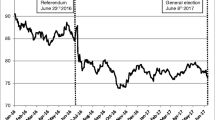Abstract
Welfens investigates the economic effects of Brexit since 2016 and provides an outlook on the likely effects still to come in 2017–2019 and what these may cost. It is shown that the short-term economic effects of the referendum are quite small while the long-run effects are quite considerable for the UK and the EU. So far, there has been a lack of economic understanding of the dynamics of regional economic disintegration, both in Europe and beyond (e.g., ASEAN and Mercosur). The non-provision of basic economic information to voters is examined in detail and questions raised about the role of the Cameron government and Her Majesty’s Treasury. Using methodology from political-economy, it is shown that result could easily have been a vote for Remain.
Access this chapter
Tax calculation will be finalised at checkout
Purchases are for personal use only
Similar content being viewed by others
References
Adler, J. (2016). Ist dies schon Tollheit, hat es doch Methode, Frankfurter Allgemeine Zeitung, Guest Contribution on August 8, 2016. http://www.faz.net/aktuell/feuilleton/BREXIT-offenbart-das-britische-verfassungsdefizit-14376231.html.
Aichele, R., & Felbermayr, G. (2015). Costs and benefits of a United Kingdom exit from the European Union. Gütersloh: Ifo Study for the Bertelsmann Foundation.
Bruno, R. et al. (2016). Gravitating towards Europe: An Econometric Analysis of the FDI Effects of EU Membership, Technical Appendix to Dhingra et al. (2016), Center for Economic Performance, London School of Economics, London.
Busch, B., & Matthes, J. (2016). Brexit—The Economic Impact. A Meta-Analysis. Köln: Institut der deutschen Wirtschaft.
Centre for European Reform. (2016). The economic consequences of leaving the EU. The final report of the CER commission on Brexit 2016, April 2016, London.
Colantone, I., & Stanig, P. (2016). Global Competition and Brexit. (September 28, 2016). BAFFI CAREFIN Centre Research Paper No. 2016–2044. Available at SSRN: https://ssrn.com/abstract=2870313 or http://dx.doi.org/10.2139/ssrn.2870313.
Dhingra, S., Ottaviano, G., Sampson, T., & van Reenen, J. (2016). The impact of Brexit on foreign investment in the UK. PAPERBREXIT03. London School of Economics, London: Center for Economic Performance.
Dolmas, J. (1998). Risk Preferences and the Welfare Cost of Business Cycles. Review of Economic Dynamics, 646–676.
Ebell, M., Hurst, I., & Warren, J. (2016). Modelling the Long-Run Economic Impact of Leaving the European Union. Economic Modelling, 59, 196–208.
European Commission. (2017a). European Economic Forecast, Winter 2017, DG ECFIN, Institutional Paper 048, February 2017, Brussels.
European Commission. (2017b). White paper on the future of Europe, reflections and scenarios for the EU27 by 2025, March 2017, Brussels.
Frey, B., & Schneider, F. (1978). A Politico-Economic Model of the United Kingdom. Economic Journal, 88, 243–253.
Froot, K., & Stein, J. (1991). Exchange rates and foreign direct investments. Quarterly Journal of Economics, 106(4), 1191–1217.
Hibbs, D. A. Jnr. (2005). Voting and the Macroeconomy, University of Göteborg (for the Oxford Handbook of Political Economy).
HM Government. (2015). Prime Minister’s speech on Europe, PM Cameron’s Chatham House speech delivered 10 November 2015. Available at: https://www.gov.uk/government/speeches/prime-ministers-speech-on-europe.
HM Government. (2016a). Why the Government believes that voting to remain in the European Union is the best decision for the UK, London. Available at: https://www.gov.uk/government/uploads/system/uploads/attachment_data/file/515068/why-the-government-believes-that-voting-to-remain-in-the-european-union-is-the-best-decision-for-the-uk.pdf.
HM Government. (2016b). HM Treasury analysis: The long-term economic impact of EU membership and the alternatives, London, April 2016. Available at: https://www.gov.uk/government/publications/hm-treasury-analysis-the-long-term-economic-impact-of-eu-membership-and-the-alternatives.
House of Commons. (2016). Commons Chamber debate transcript. April 11, 2016, Vol. 608, Minister for Europe, Mr. David Lidington. Available at: https://hansard.parliament.uk/commons/2016–04-11/debates/16041110000001/GovernmentReferendumLeaflet.
Jungmittag, A. & Welfens, P. J. J. (2016). Beyond EU-US trade dynamics: TTIP effects related to foreign direct investment and innovation. EIIW Paper No. 212—Presented at the IMF, Washington DC, June 28, 2016; forthcoming in Journal www.eiiw.eu.
Kafsack, H. & Stabenow, M. (2016). Junckers Gelübde und Farages Schmähkritik, Frankfurter Allgemeine Zeitung, No. 149, Politics Section, 29 June 2016, p. 3.
Lebo, M., & Norpoth, H. (2006). The PM and the pendulum: Dynamic forecasting of British elections. British Journal of Political Science, 37, 71–87.
Lucas, R. (1987). Models of business cycles. Oxford: Blackwell.
Mance, H. (2016). Britain has had enough of experts, says Gove. Financial Times, Online Edition, 3 June.
McGrattan, E. R., & Waddle, A. (2017). The impact of Brexit on foreign investment and production (NBER Working Paper No. 23217). Cambridge, MA.
Ottaviano, G., et al. (2014). The costs and benefits of leaving the EU. London: Centre for Economic Performance.
Pain, N., & Young, G. (2004). The macroeconomic impact of UK withdrawal from the EU. Economic Modelling, 21, 387–408.
Paldam, M. (2008). Vote and Popularity Functions. In C. K. Rowley and F. G. Schneider (Eds.), Readings in public choice and constitutional political economy (pp. 533–550). Springer.
Persson, M., et al. (2015). What if…? The Consequences, challenges & opportunities facing Britain outside EU, Open Europe Report 3/2015. London: Brussels, Berlin.
Sanders, D. (2000). The real economy and the perceived economy in popularity functions: How much do voters need to know?: A study of British data, 1974–1997. Electoral Studies, 19, 275–294.
Stegmaier, M., & Williams, L. (2016). Forecasting the 2015 British election through party popularity functions. Electoral Studies, 41, 260–263.
Welfens, P. J. J. (2011). Innovations in Macroeconomics, 3rd revised/enlarged printing. Heidelberg: Springer.
Welfens, P. J. J. (2017a). Negative welfare effects from enhanced international M&As in the Post-Brexit-Referendum UK, EIIW Paper No. 232, forthcoming www.eiiw.eu.
Author information
Authors and Affiliations
Corresponding author
Rights and permissions
Copyright information
© 2017 The Author(s)
About this chapter
Cite this chapter
Welfens, P.J.J. (2017). A Sequencing of the Economic Effects of Brexit. In: An Accidental Brexit. Palgrave Macmillan, Cham. https://doi.org/10.1007/978-3-319-58271-9_3
Download citation
DOI: https://doi.org/10.1007/978-3-319-58271-9_3
Published:
Publisher Name: Palgrave Macmillan, Cham
Print ISBN: 978-3-319-58270-2
Online ISBN: 978-3-319-58271-9
eBook Packages: Economics and FinanceEconomics and Finance (R0)




